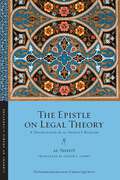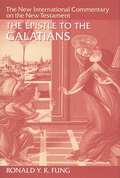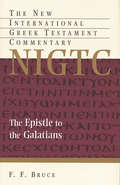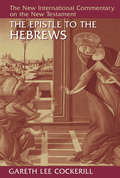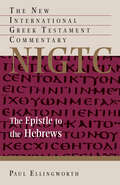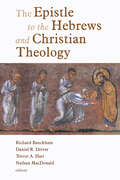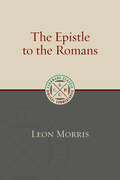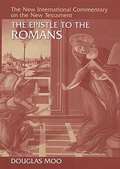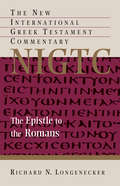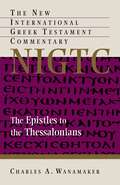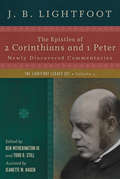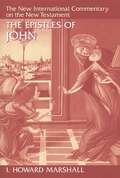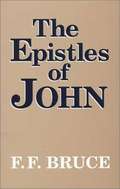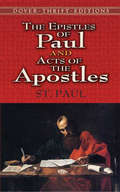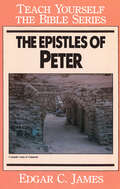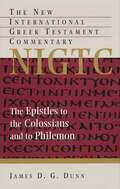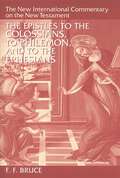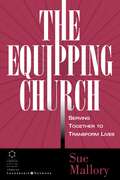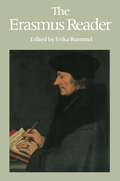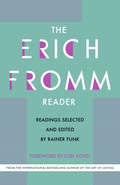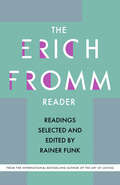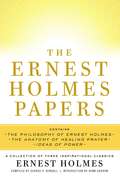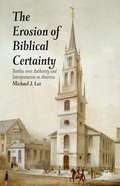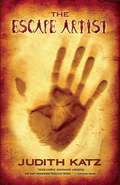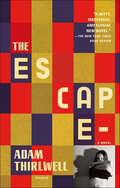- Table View
- List View
The Epistle on Legal Theory: A Translation of Al-Shafi'i's Risalah (Library of Arabic Literature #42)
by Muhammad ibn al-Shafi'iThe Epistle on Legal Theory is the oldest surviving Arabic work on Islamic legal theory and the foundational document of Islamic jurisprudence. Its author, Muhammad ibn Idris al-Shafi'i (d. 204/820), was the eponym of the Shafi'i school of legal thought, one of the four rites in Sunni Islam. This fascinating work offers the first systematic treatment in Arabic of key issues in Islamic legal thought. These include a survey of the importance of Arabic as the language of revelation, principles of textual interpretation to be applied to the Qur'an and prophetic Traditions, techniques for harmonizing apparently contradictory precedents, legal epistemology, rules of inference, and discussions of when legal interpretation is required. The author illustrates his theoretical claims with numerous examples drawn from nearly all areas of Islamic law, including ritual law, commercial law, tort law, and criminal law. The text thus provides an important window into both Islamic law and legal thought in particular and early Islamic intellectual history in general .This new translation by a leading scholar of al-Shafi'i and his thought makes available in lucid, modern English one of the earliest complete works on Islamic law—one that is centrally important for the formation of Islamic legal thought and the Islamic legal tradition.An English-only edition.
The Epistle to the Galatians (New International Commentary on the New Testament (NICNT))
by Ronald Y. FungFung's study on the Epistle to the Galatians is part of The New International Commentary on the New Testament. Prepared by some of the world's leading scholars, the series provides an exposition of the New Testament books that is thorough and fully abreast of modern scholarship yet faithful to the Scriptures as the infallible Word of God.
The Epistle to the Galatians (The New International Greek Testament Commentary)
by F. F. BrucePaul's letter to the churches of Galatia was for many years a document of special interestand study for renowned New Testament scholar F. F. Bruce. This excellent volume in theNew International Greek Testament Commentary series contains Bruce's mature work onthat important early epistle.Through phrase-by-phrase exegesis of the Greek text, consistent awareness of the historicaland geographical context, and balanced dialogue with scores of other scholars, Brucesuccessfully bridges the hermeneutical gap and makes the text of Galatians come alive forboth scholars and students. Based on careful historical-critical-linguistic exegesis yet primarilytheological in character, this commentary places special emphasis throughout onPaul's insistence on justification before God by faith apart from works of the law, and onPaul's presentation of the Spirit as the principle of the new life in Christ.
The Epistle to the Hebrews (New International Commentary on the New Testament (NICNT))
by Gareth Lee CockerillThis commentary by Gareth Lee Cockerill offers fresh insight into the Epistle to the Hebrews, a well-constructed sermon that encourages its hearers to persevere despite persecution and hardships in light of Christ's unique sufficiency as Savior. Cockerill analyzes the book's rhetorical, chiastic shape and interprets each passage in light of this overarching structure. He also offers a new analysis of the epistle's use of the Old Testament -- continuity and fulfillment rather than continuity and discontinuity -- and shows how this consistent usage is relevant for contemporary biblical interpretation. Written in a clear, engaging, and accessible style, this commentary will benefit pastors, laypeople, students, and scholars alike.
The Epistle to the Hebrews (The New International Greek Testament Commentary)
by Paul EllingworthThis superb work is sure to win a name for itself as one of the major commentaries on the Epistle to the Hebrews. The principal purpose of this substantial volume is to clarify the meaning of Hebrews, long considered a complicated and obscure book. Paul Ellingworth's fine-tooth-comb coverage of Hebrews looks at the text up close and in a broad light, enabling the reader to see the forest as well as the trees.In his determined quest to understand Hebrews, Ellingworth begins with a detailed study of the Greek text, working outward to consider the wider context, linguistic questions, and the relation of Hebrews to other early Christian writings and to the Old Testament. Nonbiblical writings such as Philo and the Dead Sea Scrolls, though less directly related to Hebrews, are considered where appropriate.Unveiling the discourse structure of this carefully written letter, Ellingworth's commentary helps make coherent sense of the complexities of Hebrews. As a result of his exhaustive study, Ellingworth finds Hebrews to be primarily a pastoral, not a polemical, writing. Showing how Hebrews beautifully emphasizes the supremacy of Christ, Ellingworth concludes that the essential purpose of the epistle - which maintains the continuity of God's people before and after Christ - is to encourage readers to base their lives on nothing other and nothing less than Jesus.A substantive bibliography and a comprehensive introduction precede Ellingworth's commentary, and three indexes - of subjects, authors, and Greek words discussed - conclude the volume.
The Epistle to the Hebrews and Christian Theology
by Richard Bauckham, Daniel R. Driver, Trevor A. Hart, and Nathan MacDonaldA significant dialogue between biblical scholars and theologians. The contributors to this substantial volume examine a number of key theological themes in the letter to the Hebrews: the person and nature of the Son, his high-priestly work, cosmology, the epistle's theology of Scripture, supersessionism, the call to faith, and more. Contributors: Edward Adams Loveday Alexander Harold W. Attridge Richard Bauckham Markus Bockmuehl Daniel Driver Douglas Farrow Trevor Hart Richard B. Hays Stephen R. Holmes Morna Hooker Edison M. Kalengyo Mariam J. Kamell Bruce L. McCormack Nathan MacDonald I. Howard Marshall R. Walter L. Moberly Carl Mosser Mark Nanos Nehemia Polen John Polkinghorne Ken Schenck Oskar Skarsaune Daniel J. Treier John Webster Ben Witherington Terry J. Wright
The Epistle to the Romans (Eerdmans Classic Biblical Commentaries)
by Leon MorrisIn this now-classic commentary, first published in 1988 in the Pillar New Testament Commentary series, noted biblical scholar Leon Morris unravels Romans and the complexities of faith and interpretation associated with the epistle.In his introduction Morris deals with matters of authorship, destination, date, occasion, and contents in a brief but helpful way. The commentary proper consists of careful verse-by-verse exposition of the text along with full and informative footnotes. Though he interacts considerably with the immense body of literature on Romans, Morris&’s approach to the study of the epistle remains clearly his own. His thorough exegesis enables readers to understand Romans as one of the greatest and most spiritually significant books in the Bible.
The Epistle to the Romans (New International Commentary on the New Testament (NICNT))
by Douglas J. MooDouglas Moo's work on the Epistle to the Romans is part of The New International Commentary on the New Testament. Prepared by some of the world's leading scholars, the series provides an exposition of the New Testament books that is thorough and fully abreast of modern scholarship yet faithful to the Scriptures as the infallible Word of God.
The Epistle to the Romans: A Commentary On The Greek Text (New International Greek Testament Commentary (NIGTC))
by Richard N. LongeneckerThis highly anticipated commentary on the Greek text of Romans by veteran New Testament scholar Richard Longenecker provides solid scholarship and innovative solutions to long-standing interpretive problems. Critical, exegetical, and constructive, yet pastoral in its application, Longenecker’s monumental work on Romans sets a course for the future that will promote a better understanding of this most famous of Paul’s letters and a more relevant contextualization of its message.
The Epistle to the Thessalonians (The New International Greek Testament Commentary)
by Charles A. WanamakerThe letters of Paul to the newly founded Christian community at Thessalonica hold a special place within the Christian tradition as possibly the earliest extant Christian writings. They are also of special interest not only for their theological value but for their sociological context. Among the communities established by Paul, the church at Thessalonica appears to have been the only one to have suffered serious external oppression. These two important epistles, then, speak uniquely to contemporary Christians living in a society often ideologically, if not politically, opposed to Christian faith.In this innovative commentary Charles A. Wanamaker incorporates what may be called a social science approach to the study of 1 and 2 Thessalonians, taking into full account the social context that gave rise to Paul’s correspondence. While Wanamaker in no way ignores traditional historical-critical, linguistic, literary, and theological approaches to writing a commentary -- in fact, at several points he makes a significant contribution to the questions raised by traditional exegesis -- at the same time he goes beyond previous commentaries on the Thessalonian correspondence by taking seriously the social dimensions both of Christianity at Thessalonica and of the texts of 1 and 2 Thessalonians themselves. In blending traditional exegetical methods with this newer approach, Wanamaker seeks to understand Pauline Christianity at Thessalonica as a socio-religious movement in the first-century Greco-Roman world and attempts to grasp the social character and functions of Paul’s letters within this context.A significant and original addition to the literature on 1 and 2 Thessalonians, this commentary will be valuable to scholars, pastors, and students alike.
The Epistles of 2 Corinthians and 1 Peter: Newly Discovered Commentaries (The Lightfoot Legacy Set)
by Todd D. Still J. B. Lightfoot Ben Witherington III Jeanette M. HagenInterVarsity Press is proud to present The Lightfoot Legacy, a three-volume set of previously unpublished material from J. B. Lightfoot, one of the great biblical scholars of the modern era. In the spring of 2013, Ben Witherington III discovered hundreds of pages of biblical commentary by Lightfoot in the Durham Cathedral Library. While incomplete, these commentaries represent a goldmine for historians and biblical scholars, as well as for the many people who have found Lightfoot's work both informative and edifying, deeply learned and pastorally sensitive. In addition to the material on the Acts of the Apostles and the Gospel of St. John, published in volumes one and two, respectively, there were fragments on 2 Corinthians and 1 Peter. Lightfoot was well known as a Pauline expert given his commentaries on Galatians, Philippians, Colossians and Philemon, and fragments of his work on Romans, 1 Corinthians, Ephesians, and 1 and 2 Thessalonians were published posthumously. It is therefore a delight to have his notes on 2 Corinthians available for the first time. Lightfoot was also interested in the life and work of Peter. The introduction to his commentary on 1 Peter provides insightful analysis of the chronology and context of the epistle. Lightfoot seeks to demonstrate that Peter knew Paul's work and that these two great apostles were in harmony regarding theology and ethics. Now complete, these three commentary volumes reveal a scholar well ahead of his time, one of the great minds of his or any generation.
The Epistles of John (New International Commentary on the New Testament (NICNT))
by I. Howard MarshallMarshall's study on the Epistles of John constitute a single volume in The New International Commentary on the New Testament. Prepared by some of the world's leading scholars, the series provides an exposition of the New Testament books that is thorough and fully abreast of modern scholarship yet faithful to the Scriptures as the infallible Word of God.
The Epistles of John: Introduction, Exposition, and Notes
by F. F. BruceOther books by this author are available from Bookshare.
The Epistles of Paul and Acts of the Apostles (Dover Thrift Editions: Religion)
by St. PaulSaul of Tarsus was on his way to Damascus, bent on destroying the city's Christian community, when a blinding flash of light stopped him in his tracks. Forever changed, the former persecutor of Christians adopted the name Paul and became one of the faith's most famous and active converts. Paul's living example, showing that no sinner is beyond redemption, added a powerful weight to his missionary work. The apostle's letters to churches that he established or visited constitute a substantial part of the New Testament. This volume features a selection of books from the King James edition of the Bible featuring Paul's own words, and a view of his life and ministry.Martin Luther described Paul's Epistles to the Romans — or Romans — as the "most important piece in the New Testament" and "well worth a Christian's while, not only to memorize it word for word but also to occupy himself with it daily, as though it were the daily bread of the soul." Acts of the Apostles — or Acts — discusses Jesus' resurrection and ascension and the ministry of the original Twelve Apostles, in addition to Paul's conversion and the extension of Christianity through him to the "remotest part of the earth."
The Epistles of Peter-Teach Yourself the Bible Series (Teach Yourself the Bible)
by Edgar JamesThe Teach Yourself the Bible Series is one of the best New Testament studies you will find anywhere. Each book in the series is packed full of valuable questions on individual chapters of the Bible, check-ups to test your grasp of scriptural truths, and usable suggestions for group study.Grow in your knowledge of God through each New Testament book, then go on to study six aspects of Christianity essential for all believers: doctrine, prayer, eternal life, prophecy, Christian character, and Bible study. The apostle Peter had received word of the persecution of the churches and the assault of false teachers upon them. In his old age, he wrote words of comfort and counsel to discouraged believers everywhere. No letters of the New Testament hit more directly home to those in trial and persecution than do the epistles of Peter. Strengthen your relationship with the living God with all twenty-five books of the Teach Yourself the Bible Series. Each volume is a timeless, yet practical, study of the Word of God.
The Epistles to the Colossians and to Philemon (The New International Greek Testament Commentary)
by James D. DunnPaul's Epistle to the Colossians merits detailed study for at least two reasons. First, it provides an unexpectedly interesting window into the character of Christianity in Asia Minor in the second half of the first century. With the information it gives about the religious tensions within which emergent Christianity was caught up, not least those between Christianity and diaspora Judaism, we begin to gain more insight into the influences and factors that shaped the transition from apostolic to subapostolic Christianity in the region. Second, Colossians represents a crucial stage in the development of Pauline theology itself. Whether it was written at the end of Paul's life or soon after his death, it indicates how Pauline theology retained its own vital character and did not die with Paul.In this volume in the celebrated New International Greek Testament Commentary, James D. G. Dunn, author of numerous well-received works on the historical origin and theological interpretation of the New Testament, provides detailed expositions of the text of Paul's letters to the Colossians and to Philemon.Dunn examines each of these letters within the context of the Jewish and Hellenistic cultures in the first century, and discusses the place of Colossians and Philemon in the relationship between the Pauline mission and the early churches that received these letters. Particular stress is also placed on the role of faith in Jesus Christ within and over against Judaism and on the counsel of these two important letters with regard to the shaping of human relationships in the community of faith.
The Epistles to the Colossians, to Philemon, and to the Ephesians (New International Commentary on the New Testament (NICNT))
by F. F. Bruce“. . . undertaken to provide earnest students of the New Testament with an exposition that is thorough and abreast of modern scholarship and at the same time loyal to the Scriptures as the infallible Word of God.” This statement reflects the underlying purpose of The New International Commentary on the New Testament. Begun in the late 1940s by an international team of New Testament scholars, the NICNT series has become recognized by pastors, students, and scholars alike as a critical yet orthodox commentary marked by solid biblical scholarship within the evangelical Protestant tradition.While based on a thorough study of the Greek text, the commentary introductions and expositions contain a minimum of Greek references. The NICNT authors evaluate significant textual problems and take into account the most important exegetical literature. More technical aspects — such as grammatical, textual, and historical problems — are dealt with in footnotes, special notes, and appendixes.Under the general editorship of three outstanding New Testament scholars — first Ned Stonehouse (Westminster Theological Seminary, Philadelphia), then F. F. Bruce (University of Manchester, England), and now Gordon D. Fee (Regent College, Vancouver, British Columbia) — the NICNT series has continued to develop over the years. In order to keep the commentary “new” and conversant with contemporary scholarship, the NICNT volumes have been — and will be — revised or replaced as necessary.The newer NICNT volumes in particular take into account the role of recent rhetorical and sociological inquiry in elucidating the meaning of the text, and they also exhibit concern for the theology and application of the text. As the NICNT series is ever brought up to date, it will continue to find ongoing usefulness as an established guide to the New Testament text.
The Equipping Church: Serving Together to Transform Lives
by Sue MalloryPicture your church as a place where the priesthood of believers finds its expression in creative and powerful ways. Picture leaders and staff equipping and unleashing people to minister in ways consistent with how God designed them. Think of the effectiveness, vitality, and contentment that come when the body of Christ nurtures itself through the healthy give-and-take of each member. In The Equipping Church, Sue Mallory describes the benefits, the structure, and the culture of an equipping church and shows how your congregation can become one. This book is about limitless possibilities. Think "vision." What might your church look like if its members became vital, fully empowered partners in ministry? How can you help them discover and release their full potential? How would their roles change--and yours? AN EQUIPPING CHURCH IS A CHURCH WHERE: * pastors and leaders enable church members to share in ministry * people’s gifts, talents, and life callings are matched with areas of service * ministry opportunities are recognized and developed * the culture encourages the growth of a broad array of ministries *a well-designed system addresses needs of every kind, both individual and corporate *the pastor doesn’t have to be all things to all people Unpacking insights and principles uncovered by Leadership Training Network over the last several years, Mallory helps you customize an equipping system and culture in your church. You’ll proceed from preparation (what you need to know), to foundations (what you need to change), to construction (what you need to do). In the process, Mallory takes you inside the story of her own church, Brentwood Presbyterian, to observe the different stages of their trial-and-error journey and how it has transformed their approach to "doing church." See how they dealt with various concerns that arose along the way, and meet men and women whose lives have been changed because Brentwood took the ministry road less traveled. Each chapter includes a section of "Equipping Principles," questions for discussion and reflection, and a summary of different equipping churches from around the country. With the accompanying Equipping Church Guidebook, this book will be a mile marker in your church--and the gateway to a more effective and biblical approach to ministry.
The Erasmus Reader
by Desiderius Erasmus Erika RummelCollected Works of Erasmus ... thoughtfully designed to include major statements of Erasmus on civility in individual morals, humanistic study and education, the Christian life, reform of the church, and the peaceful constraint of political force. It is to my mind the most comprehensive and penetrating anthology of Erasmus' writing, forcefully revealing his central values." - Charles Trinkaus, Emeritus Professor of History, University of Michigan 'Rummel's collection makes available readable translations of Erasmus' most original and influential works - the books that made him the intellectual conscience of his generation of scholars and the inspiration of many Reformers who took positions he did not accept. They reveal the biblical scholar, the humanist and literary theorist, and the social critic that Erasmus was, far more fully and vividly than any previous anthology.' - Anthony Grafton, Program in History of Science, Princeton University 'The high quality of the Toronto edition of the Collected Works of Erasmus has earned it a central place in the libraries of scholars around the world. The Erasmus Reader extends this impact to the carrels and desks of beginning and advanced students of Renaissance and Reformation history.' - Heiko A. Oberman, Director, Division for Late Medieval and Reformation Studies, University of Arizona
The Erich Fromm Reader
by Erich Fromm Rainer Funk Joel KovelFromm's basic idea was to look at the individual as a social being and to look at society as an ensemble of many individuals who have not only common ideas and convictions based on a common practice of life but also a common psychic structure. With his concept of "social character" he created a new interdisciplinary thinking presented in this reader. The Erich Fromm Reader exhibits the true genius of an original thinker in seeing the connections between overlapping knowledge from many different fields. Here interdisciplinarity is not only a lip service but the impact of Erich Fromm's unique social psychological notion.
The Erich Fromm Reader: Readings Selected and Edited by Rainer Funk
by Erich Fromm&“Fromm crossed the boundaries of traditional disciplines to expound his view on the alienation of man in an increasingly technological world.&” —Newsweek Erich Fromm&’s basic idea was to look at the individual as a social being, and to look at society as an ensemble of many individuals who have not only mutual ideas and convictions based on a common practice of life, but also a shared psychic structure. With his concept of &“social character,&” Fromm created a new interdisciplinary thinking presented in this compendium.The Erich Fromm Reader exhibits the true genius of an original thinker in seeing the connections between overlapping knowledge from many different fields. Here, interdisciplinarity is not only a lip service but the impact of Erich Fromm&’s unique social psychological notion.
The Ernest Holmes Papers
by Ernest Holmes George P. BendallA one-of-a-kind collection of rare writings from one of the world's foremost spiritual leaders and thinkers. For the first time, the three hard-to-get volumes known as The Ernest Holmes Papers will be published in one volume. Transcripts of talks that Ernest Holmes gave over his career, The Ernest Holmes Papers contains Holmes's wisdom on prayer, life, prosperity, and God. Used by thousands of spiritual students around the world in previous editions, this first-ever omnibus edition will contain a new introduction from Dr. Kenn Gordon, spiritual leader of the Centers for Spiritual Living. The three volumes that are being included in this one volume are The Philosophy of Ernest Holmes, Anatomy of Healing Prayer, and Ideas of Power.
The Erosion of Biblical Certainty: Battles over Authority and Interpretation in America
by Michael J. LeeAccording to conventional wisdom, by the late 1800s, the image of Bible as a supernatural and infallible text crumbled in the eyes of intellectuals under the assaults of secularizing forces. This book corrects the narrative by arguing that in America, the road to skepticism had already been paved by the Scriptures' most able and ardent defenders.
The Escape Artist
by Judith Katz"Katz lives up to her first novel's potential in this moving, funny, wholly original picaresque about a nice Jewish girl. . . . The pasts and common destiny of two remarkable women-related with perfect timing in Sofia's convincing Yiddish-tinged English-come together beautifully in this nicely crafted, emotionally satisfying, and well-researched historical fiction."-Publishers Weekly"The Escape Artist, a brilliant work of historical fiction . . . fast-paced and gorgeously written novel" -Liberty PressSet in the brothels and gangster dens of Jewish Buenos Aires at the beginning of the twentieth century, The Escape Artist catapults us into the lives of Sofia Teitelbaum and Hankus Lubarsky.Sofia, a nice Jewish girl from Poland, is lured away from home by Tutsik Goldenberg, a wealthy traveling businessman who claims to be a lonely Argentine diamond merchant in search of a wife. Upon arriving in Buenos Aires, Tutsik dumps Sofia at his sister's brothel.Hankus, also a nice Jewish girl from Poland, is passing as a man. Having escaped the pogroms of Poland that killed her family, she lives her life as a handsome and mysterious magician and escape artist.When Tutsik spots the talented juggler and acrobat Hankus he envisions success as his manager, seeing Hankus as the means to get out from under his sister's thumb.Sofia and Hankus fall in love and their attempts to walk the tightrope of love, freedom, and independence are quickly put to the test.Sex, deception, magic, and love are the main ingredients of this tour de force novel by Lambda Literary Award winner Judith Katz. In The Escape Artist, Katz reveals that all human interactions consist of love and hate, deception and candor, altruism and self-interest. This is as true in our lives today as it was in an immigrant community at the turn of the last century.Judith Katz is the author of two published novels, The Escape Artist and Running Fiercely Toward a High Thin Sound, which won a Lambda Literary Award for Best Lesbian Fiction. She has received Bush Foundation, McKnight Foundation, and National Endowment fellowships for fiction.
The Escape: A Novel
by Adam ThirlwellHaffner is charming, morally suspect, vain, obsessed by the libertine emperors. He is British and Jewish and a widower. But Haffner's attachments to his nation, his race, his marriage, have always been matters of conjecture. They have always been subjects of debate.There are many stories of Haffner—but this, the most secret, is the greatest of them all. The Escape opens in a spa town snug in the unfashionable eastern Alps, where Haffner has come to claim his wife's inheritance: a villa expropriated in darker times. After weeks of ignoring his task in order to conduct two affairs—one with a capricious young yoga instructor, the other with a hungrily passionate married woman—he discovers gradually that he wants this villa, very much. Squabbling with bureaucrats and their shadows means a fight, and Haffner wants anything he has to fight for.How can you ever escape your past, your family, your history? That is the problem of Haffner's story in The Escape. That has always been the problem of Haffner—and his lifetime of metamorphoses and disappearances. How might Haffner ever become unattached?Through the improvised digressions of his comic couplings and uncouplings emerge the stories of Haffner's century: the chaos of World War II , the heyday of jazz, the postwar diaspora, the uncertain triumph of capitalism, and the inescapability of memory.The Escape is a swift, sad farce of sexual mayhem by a brilliant young novelist The New York Times has called "a prodigy and, as such, unstoppable."
